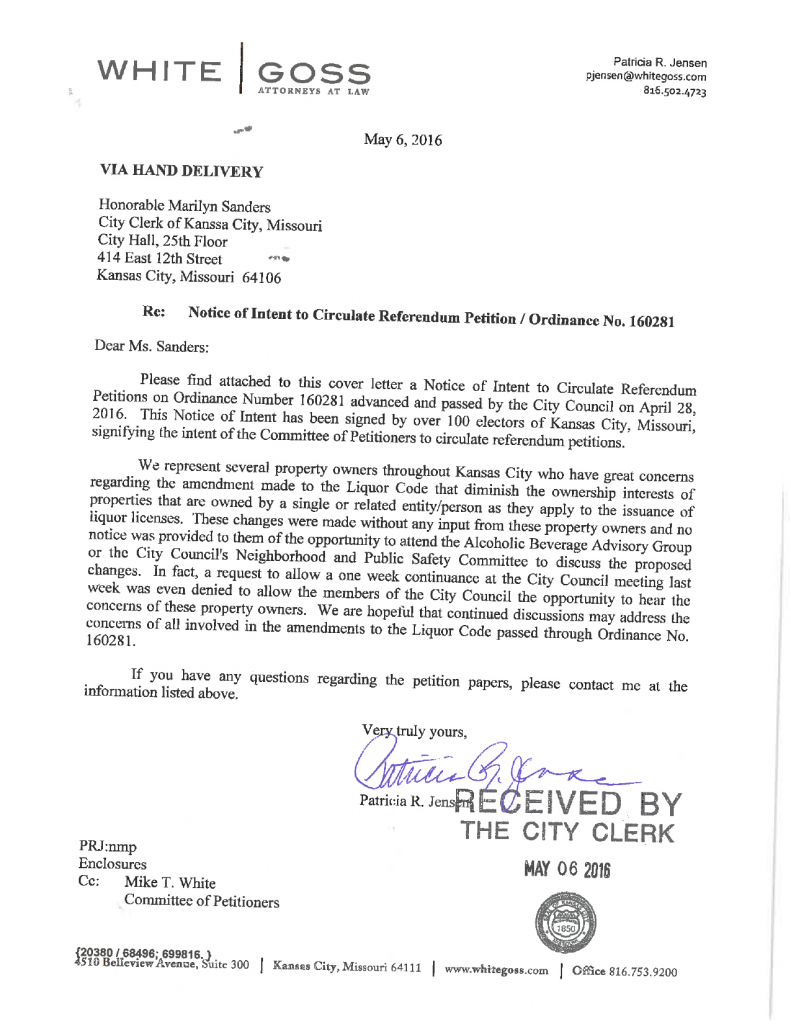Supporters of a new Kansas City liquor law hope it will put a stop to what they say are anti-competitive practices by a prominent Crossroads Arts District developer.
The recently-passed measure — Ordinance No. 160281 — amends portions of city code to increase the number of property owners who can offer consent for liquor licenses for nearby businesses. Supporters of the new law say it prevents a person or small group from imposing burdensome and anti-competitive rules in exchange for a liquor license.
To obtain a liquor license, several Crossroads business owners said they’ve felt forced to agree to rules that limit their hours, menu items, the types of alcohol they can serve, live music events, dancing and even the genres of music they can play. The Sundry, Tom’s Town Distillery Co. and Ruins Pub are three of the at least 10 firms affected by the anti-competitive measures, one Kansas City official said.
Implementation of the amended law, however, is on hold as a group of petitioners led by Crossroads developer Brad Nicholson tries to collect 3,700 signatures for a referendum vote. If the threshold of signatures is met, implementation of the amended ordinance will be decided by voters in Kansas City’s next municipal elections. The petitioners have “great concerns” regarding the law, saying that it diminishes the ownership interests of their own properties.
Nicholson said that in recent years he’s been concerned by the growing number of liquor license applicants in the Crossroads. He said that as more businesses in the area serve liquor and stay open later, the more safety challenges the Crossroads will face. He wants to be respectful to the area’s residential community, in addition to maintaining it as a safe place.
Nicholson added that his efforts have been to preserve the Crossroads’ artistic character and not become a bar district. Nicholson owns at least 26 properties in Kansas City, though many in the Crossroads are surface parking lots, according to Kansas City’s parcel viewer. He also re-developed the Globe Building, in which Think Big Partners operates.
“I love the Crossroads — I’ve worked there for 25 years when nobody wanted to be there except the artists and I embraced that,” he said. “The Crossroads is the coolest place in Kansas City. … I’ve patrolled the neighborhood at night when we had rampant crime and I’ve served on every committee and board. I care about it. … I love my town.”
Nicholson said that the conditional measures in new businesses’ liquor licenses — such as limiting hours or types of alcohol for sale — are intended to mitigate the potential effects of a loophole in city liquor licensing. That loophole, he said, is that a business that plans to close can sell its liquor license to another tenant, which could be contrary to the wishes of its neighbors.
“These weren’t arbitrary things — they meant something based on what we were trying to accomplish,” Nicholson said. “Right now it’s the only tool that we have that allows us to have some control over liquor licenses versus just say ‘no, I’m not going to sign.’”
“If we’re going to accomplish the Chamber’s Big Five initiative of being the most entrepreneurial city in America, we need to rectify the unintended consequences of ordinances like this.” -Ryan Wing
Nicholson and petitioners say changes were made to the law without input from them as property owners, though Kansas City Councilwoman Jolie Justus said at least two public hearings were held.
Justus — who is in favor of revamping the consent process and sponsored the new ordinance — said the amended law increases the amount of input a neighborhood has on the types of businesses entering its borders. The new law, however, can prevent some of the “unreasonable” requirements that a single property owner like Nicholson can place on businesses, she said.
“One person holding the consent back said he would give (a business owner) consent if she agreed not to play hip-hop music,” Justus said when offering an example of the requirements. “There have been some really unreasonable requests. It’s not at all the spirit of the conditional liquor license and it’s definitely not what we anticipated when it was crafted.”
Justus said the new law improves the liquor licensing process because it requires business owners to reach out to a greater number of neighbors for consent, limiting the power of a single person or small group. The amended law states that no more than ten percent of eligible properties included in a consent radius — 500 feet in most cases — can be owned by the same person. This means that if a liquor license applicant is surrounded by properties owned by the same person, the consent radius would widen to reach additional property owners.
Justus said that the petition effort is particularly frustrating because Nicholson and others petitioners have yet to contact her or the city to offer alternative solutions.
“Brad Nicholson has never contacted my office nor has anyone on his behalf contacted my office,” Justus said. “I assume he has a system that has worked for him and he wants to maintain that system. Anyone who wants to talk to me about how we can make this better — but still fair — I’m ready, willing and able.”
Nicholson said that the petition was the last option he and other concerned Crossroads residents had to allow for more citizen input on the law. Nicholson plans to meet with Councilwoman Justus as soon as possible to discuss the law.
“With the petition, we felt trapped,” he said. “Doing that was our only choice. The person that was sponsoring this thing wasn’t willing to give a one week hold.”
“The group behind the ballot initiative includes the bullies who were the worst abusers of the old system.” – Steve Revare
Jim Ready, the manager of Kansas City’s regulated industries division, testified on the issue before the Kansas City Council. Ready told the council he’s seen an increasing number of liquor license applicants who say one or a small number of eligible consenters will only give consent for a license if the applicant “enters into a conditional liquor license agreement which (the applicant) feels will ultimately be detrimental to their business.
“When this occurs, it means that one person or small group of people has more power and control than the Mayor, City Council or City Manager when it comes to issuing a liquor license,” Ready wrote.
A variety of business owners agree with Ready, including the Sundry owner Ryan Wing. He recently testified before the city council, detailing his company’s challenges with the law. Wing said that he negotiated with Nicholson for several months before “begrudgingly” agreeing to liquor license terms that restrict his restaurant/grocery store’s operations.
Wing said that to receive a liquor license, the Sundry agreed to: not sell or serve any distilled spirits; close by 11 p.m.; and to host only 12 live music events each year. Another seemingly arbitrary rule is that the Sundry can only have 15-linear-feet of shelf space to sell its wine or beer, he said.
“(Nicholson’s) public message is that he’s protecting the neighborhood, which is insulting,” Wing said. “It’s been dumbfounding because I’m trying to bring a grocery store to an area that has no access to groceries. I feel like I’m part of enhancing the Crossroads neighborhood. … To be met with this idea that I might bring violence or detriment to the neighborhood caught me off guard, but it is also insulting.”
Wing said that if Kansas City wants to fulfill its goals, it’s going to need to topple challenges like this.
“If we’re going to accomplish the Chamber’s Big Five initiative of being the most entrepreneurial city in America, we need to rectify the unintended consequences of ordinances like this when they are discovered,” Wing said. “At this point, the city has done their part rectifying this situation, but we must figure out how to keep Kansas City moving forward without ballot initiatives challenging every decision that a special interest group disagrees with.”
Tom’s Town Distillery owner Steven Revare said he also has faced “anti-competitive” and “arbitrary” measures against his business, which opened in 2015. The restrictions, he said, include serving only one type of beer, red and white wine; closing 90 minutes before the surrounding bars; having no DJs; and keeping its windows shut at all times.
Revare took to Facebook to express his frustration with the rules and the petition effort.
“The group behind the ballot initiative includes the bullies who were the worst abusers of the old system,” he wrote. “Rounded out by anti-competitive developers and their cronies, the group has questionable credibility. They were caught flat-footed by the regular process they use every day, and had to resort to gimmicky loopholes to delay the will of our elected officials.”
The petitioners have until June 17 to acquire the 3,700 signatures needed for a referendum vote. The petition effort is led by Nicholson, Jeff T. Owens, Laura Johnson, Thomas R. Stiller and Burgess Zbryk.
Below is a copy of the petition as provided by the City of Kansas City, Mo. For the full petition, click here.




































